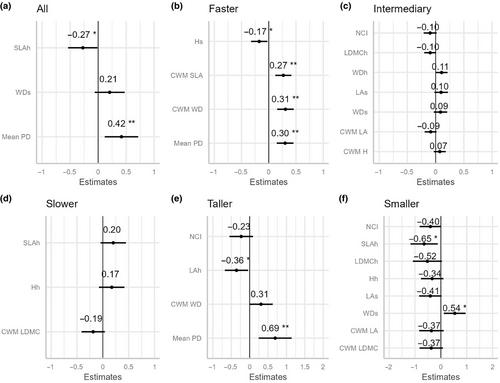To comprehensively understand ecological dynamics within a forest ecosystem, it is vital to explore how surrounding trees influence the growth of individual trees in a community. This study investigates the importance of biotic interactions on tree growth by examining several metrics of competitive interactions and community structure and considering three classes of intrinsic growth rates among the focal individuals: slower, intermediate, and faster-growing trees. We also separated the focal trees based on their canopy position.
Brazilian subtropical forests.
We assessed various factors related to the focal trees and their neighbors, including differences in traits, neighborhood crowding, phylogenetic distance, and overall trait composition within the community. We then ran linear mixed-effects models to test how these different metrics influenced the growth rates of the focal trees.
Our results indicate that phylogenetic distance is linked to higher growth. Specific leaf area (SLA), leaf area (LA), and wood density (WD) are significantly related to tree growth. Trees surrounded by neighbors with higher SLA than themselves grow better, particularly smaller trees. Similarly, taller trees with smaller LA than their neighbors grow better. Trees in the intermediary growth class grow better when they have higher WD than their neighbors. Conversely, smaller trees benefit from greater WD difference between the focal trees and their neighbors, while height difference negatively impacts faster-growing trees. Moreover, communities with higher SLA and WD positively impact the growth of faster-growing trees.
We conclude that the interactions between trees are mediated by their ecological differences, but the performance and responses to surrounding competitors vary along with their grow class and position within a community. This study has revealed that the tree's intrinsic growth rate mediates the effect of traits and phylogeny of surrounding trees on individual tree growth.



